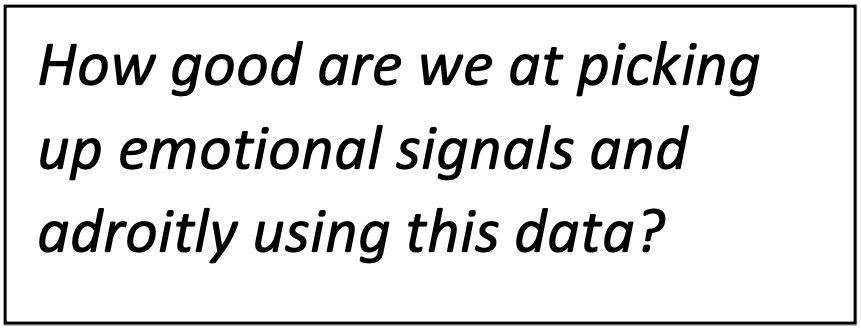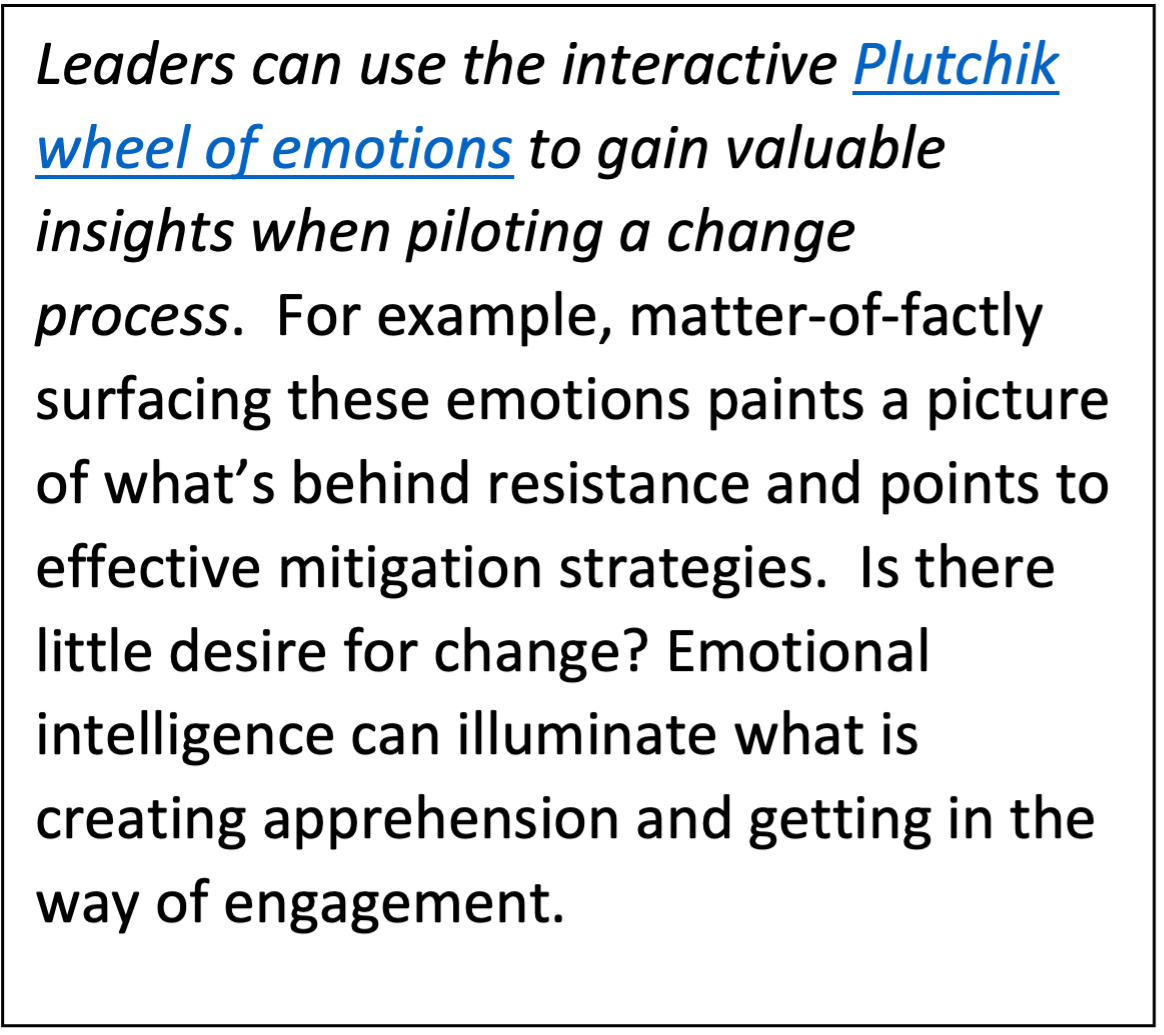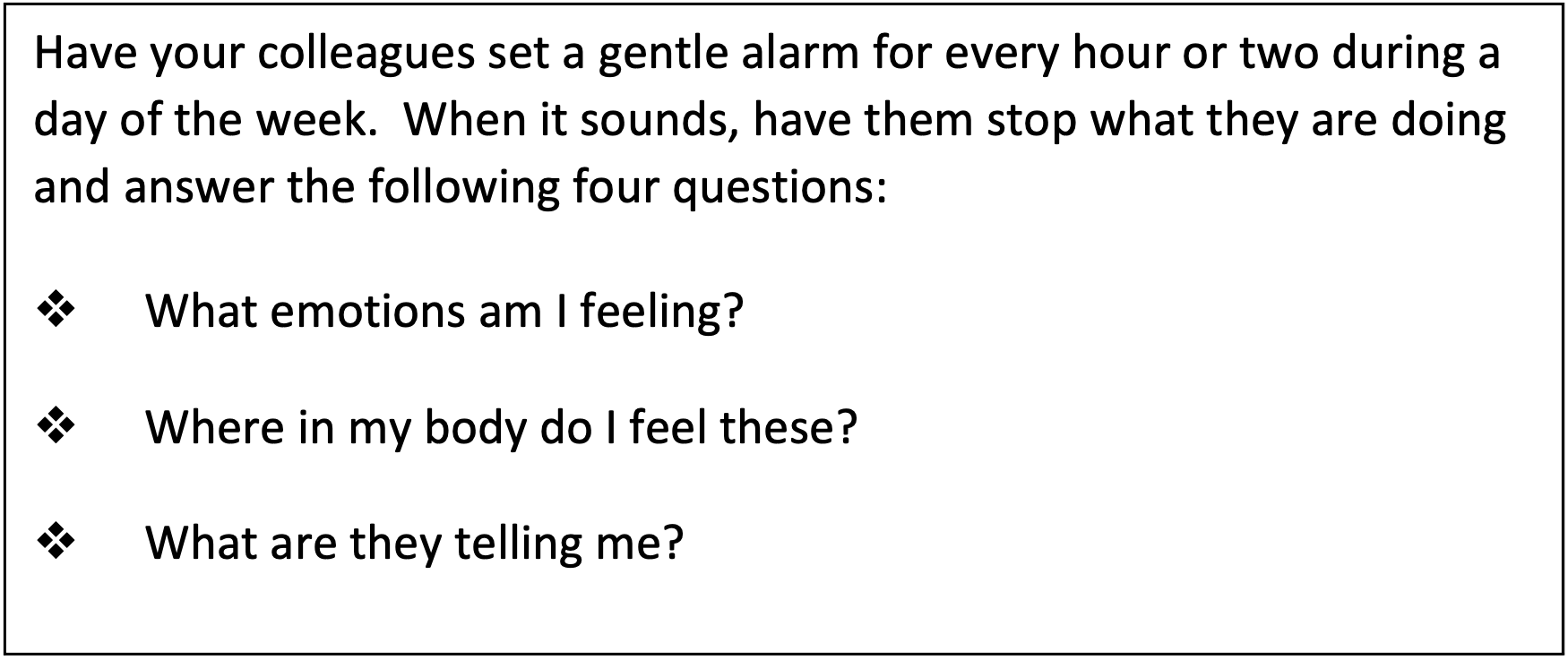Let’s Be EQ Smart about Emotions When Change is Afoot
3 minute read
Emotions are data that emotionally intelligent (EQ) leaders and organizations can use to adeptly navigate change and strengthen employee engagement. If you’re reading this, you’ve likely sat in the change management cockpit. This article invites you to become skilled at reading the emotion dials on the flight deck console of your change project and use that data for successful change implementation. Seasoned pilots and passengers know it’s not fun to fly in turbulent air space… and you shouldn’t have to!
Simply put, emotions are messages from us, to us.[ii] Why would we not want to pay attention?

To quote General Electric’s Jack Welch, “No doubt emotional intelligence is more rare than book smarts, but my experiences says it is actually more important in the making of a leader.”[v] This statement is supported by data that suggests that EQ is more important than IQ as a meta-ability that allows us to harness our innate abilities for a fulfilling and rewarding career.[vi] Chip Heath, professor at Stanford’s business school, advises change practitioners to “pay attention to creating an emotional case for change, not just an analytical one.”[iii] Good advice, but easier said than done!
Better than leaving emotions at the door – because you can’t – gain insights from them to more deftly navigate change.
Valuing EQ smarts is resisted because it requires a mental shift from a negative view of emotions as unwelcome in the workplace, to knowing them as assets. How many times have you heard the refrain “if only people would leave their emotions at the door, resistance to change would evaporate!” You don’t have to welcome getting annoyed in a meeting, but you can be satisfied when you are attuned to that feeling and can use that data well.
Because emotions always come into the room with us, EQ smart change practitioners strive for self-efficacy which give us greater cognitive control and the ability to regulate our response. Self-efficacy is not leaving emotions at the door, rather harnessing an awareness of them and using navigational skills to produce better decisions, better relationships and the ability to lead with your best self.[iv]
Fortunately, conventional wisdom about emotions in the workplace is changing. That’s a good thing. Neuroscience explains why emotions are never left at the door, nor can they be. Emotions like surprise, sadness, anger and anticipation are simply chemicals in our bodies that should tell us something. Sadness signals something important is missing. Surprise points out that reality is different from our beliefs. Anger alerts us to something or someone who has blocked our way forward… and we’re not liking it![i].


EQ smart leaders foster employee engagement when change is afoot
Still not convinced about the value of EQ smart change leadership? Know that the business case for EQ is compelling. If you agree that navigating emotions fosters engagement in a change process and engaged people drive business transformation, nothing about the business case should surprise you. At Amadori, a McDonald’s supplier in Italy, scores on an EQ assessment predicted employee engagement, a factor directly correlated with plant performance. Following an EQ intervention at Siemen’s Healthineers, the number of engaged managers doubled and the number disengaged dropped by over half. [vii]
Engaged employees are the ones who are full participants in the change initiative at every level: cognitively, emotionally and physically. You can foster this awareness and build EQ competency muscles with the following exercise:

Insights into emotions attune us with ourselves and one another at a time when the world’s workplace is being reimagined.
Virtual work during a pandemic has simultaneously separated us and dropped us into each other’s home offices and living rooms, places of emotional turbulence for many. EQ smart change leaders have reached out, meaningfully connected with colleagues, smoothing the transition to the new world of work that is emerging. The good news is that these EQ lessons learned bumping through the turbulence of 2020 can stay with us. Stop and think for a moment how awareness of your own emotions over the past year caused you to connect with other people in a different way. That’s a good place to start your EQ journey!
[i] Freeman, Joshua (2019) At the Heart of Leadership: How to Get Results with Emotional Intelligence. Six Seconds, pp. 132-136.
[ii] Freeman, Joshua (2020) Decode Your Emotions with One Simple Tool [video] www.6seconds.org/2020/08/11/plutchik-wheel-emotions/
[iii] Mckinsey & Company (2010, March 1) Making the Emotional Case for Change: An Interview with Chip Heath. www.mckinsey.com
[iv] Freeman, Joshua (2019), p. 3.
[v] Ibid, p. 12.
[vi] Goleman, Daniel (2006) Emotional Intelligence (Kindle) Bantam Books. Retrieved from Amazon.com.
[vii] Freeman, Joshua (2019), pp. 6, 44-46.
 David Wunsch is a Change Management Practitioner focused on helping organizations thrive when making strategic pivots. David has worked in Spanish and English with organizations in the U.S. and around the globe to manage change through people-centered solutions that capitalize on emerging opportunities, optimize team performance, and grow revenue streams. David pairs skilled facilitation to his change management practice to tap into the wellspring of knowledge and expertise housed in diverse work forces. Practice areas: culture shift, technology adoption, business process redesign, Technology of Participation (ToP®) facilitation methodology.
David Wunsch is a Change Management Practitioner focused on helping organizations thrive when making strategic pivots. David has worked in Spanish and English with organizations in the U.S. and around the globe to manage change through people-centered solutions that capitalize on emerging opportunities, optimize team performance, and grow revenue streams. David pairs skilled facilitation to his change management practice to tap into the wellspring of knowledge and expertise housed in diverse work forces. Practice areas: culture shift, technology adoption, business process redesign, Technology of Participation (ToP®) facilitation methodology.